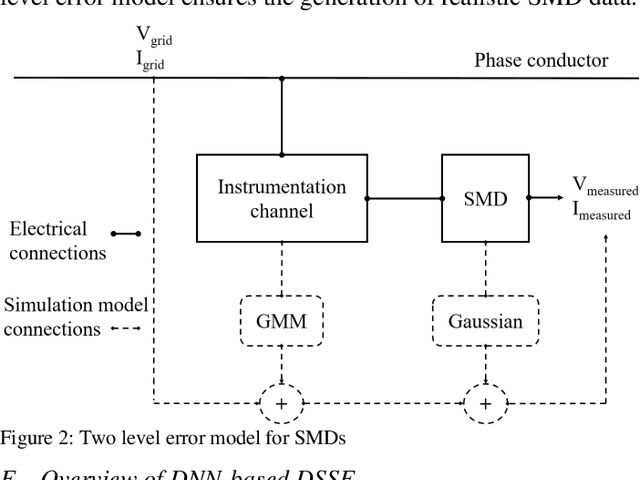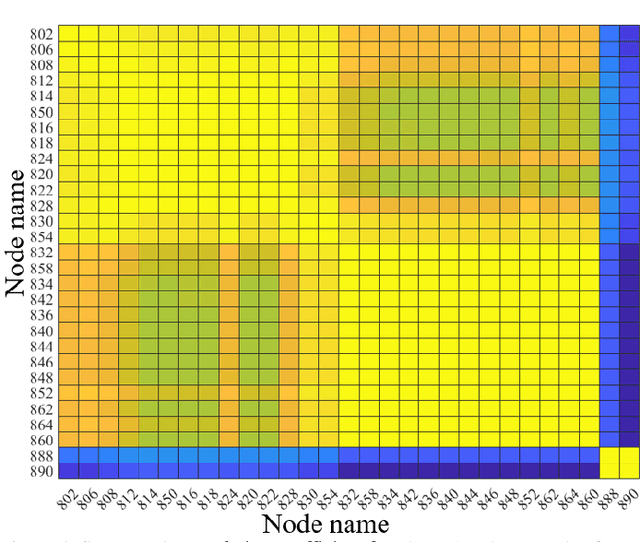Behrouz Azimian
Creating Temporally Correlated High-Resolution Power Injection Profiles Using Physics-Aware GAN
Nov 22, 2023Abstract:Traditional smart meter measurements lack the granularity needed for real-time decision-making. To address this practical problem, we create a generative adversarial networks (GAN) model that enforces temporal consistency on its high-resolution outputs via hard inequality constraints using a convex optimization layer. A unique feature of our GAN model is that it is trained solely on slow timescale aggregated power information obtained from historical smart meter data. The results demonstrate that the model can successfully create minutely interval temporally-correlated instantaneous power injection profiles from 15-minute average power consumption information. This innovative approach, emphasizing inter-neuron constraints, offers a promising avenue for improved high-speed state estimation in distribution systems and enhances the applicability of data-driven solutions for monitoring such systems.
Analytical Verification of Deep Neural Network Performance for Time-Synchronized Distribution System State Estimation
Nov 12, 2023Abstract:Recently, we demonstrated success of a time-synchronized state estimator using deep neural networks (DNNs) for real-time unobservable distribution systems. In this letter, we provide analytical bounds on the performance of that state estimator as a function of perturbations in the input measurements. It has already been shown that evaluating performance based on only the test dataset might not effectively indicate a trained DNN's ability to handle input perturbations. As such, we analytically verify robustness and trustworthiness of DNNs to input perturbations by treating them as mixed-integer linear programming (MILP) problems. The ability of batch normalization in addressing the scalability limitations of the MILP formulation is also highlighted. The framework is validated by performing time-synchronized distribution system state estimation for a modified IEEE 34-node system and a real-world large distribution system, both of which are incompletely observed by micro-phasor measurement units.
High-Speed State Estimation in Power Systems with Extreme Unobservability Using Machine Learning
Dec 04, 2022



Abstract:Fast timescale state estimation for a large power system can be challenging if the sensors producing the measurements are few in number. This is particularly true for doing time-synchronized state estimation for a transmission system that has minimal phasor measurement unit (PMU) coverage. This paper proposes a Deep Neural network-based State Estimator (DeNSE) to overcome this extreme unobservability problem. For systems in which the existing PMU infrastructure is not able to bring the estimation errors within acceptable limits using the DeNSE, a data-driven incremental PMU placement methodology is also introduced. The practical utility of the proposed approach is demonstrated by considering topology changes, non-Gaussian measurement noise, bad data detection and correction, and large system application.
Time Synchronized State Estimation for Incompletely Observed Distribution Systems Using Deep Learning Considering Realistic Measurement Noise
Nov 09, 2020



Abstract:Time-synchronized state estimation is a challenge for distribution systems because of limited real-time observability. This paper addresses this challenge by formulating a deep learning (DL)-based approach to perform unbalanced three-phase distribution system state estimation (DSSE). Initially, a data-driven approach for judicious measurement selection to facilitate reliable state estimation is provided. Then, a deep neural network (DNN) is trained to implement DNN-based DSSE for systems that are incompletely observed by synchrophasor measurement devices (SMDs). Robustness of the proposed methodology is demonstrated by considering realistic measurement error models for SMDs. A comparative study of the DNN-based DSSE with classical linear state estimation (LSE) indicates that the DL-based approach gives better accuracy with a significantly smaller number of SMDs
 Add to Chrome
Add to Chrome Add to Firefox
Add to Firefox Add to Edge
Add to Edge